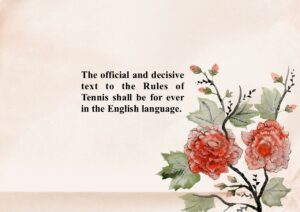I am old enough to remember the Sears Catalog. It was always a glorious day when the Sears Christmas Catalog arrived in the mail, featuring all the pictures and descriptions of the toys I might want for Christmas. I poured through that thing with a fine tooth comb,
My USTA section publishes an annual Tournament Guide. It is distributed in both print and electronic form. When I started heading down this path this morning, I didn’t have to search for my printed copy. I knew exactly where to find it. That publication is the foundation for my annual tournament schedule. Combing through these things evokes the same feeling that the Sears Christmas catalog did all those years ago.
Yesterday I wrote about how the financial and liability structures of the USTA and UTR was very likely a dominant contributing factor in the decisions the organizations made about the suspension of tennis tournament play under COVID-19. Today I am exploring how the independent nature of UTR creates an agility advantage for UTR event organizers.
Let’s say that I am a facility manager and I decide that I want to host a USTA sanctioned tennis tournament. To do that, I would have to know to consult Article III of the USTA Texas Section Standing Orders. This is something that does easily come up in Google queries. Fortunately, I knew where to look because the umpire who gave birth to me used to run tournaments and sit on a lot of Texas Section committees.

I would have to apply for sanctioning for my prospective tournament from the USTA Texas section office. It would most likely be awarded a low number of ranking points, because there is a bidding process for tournaments with a higher number of points that I have presumably missed in this hypothetical scenario.
In order to obtain a USTA sanction I would have to identify at least three individuals to form the tournament committee. This includes a tournament director, a tournament referee, and at least one additional member. The referee has to be a certified USTA referee. Since the umpire I gave birth to fairly recently went through the process, I know that this involves an online course and then a training and evaluation period at a USTA tournament. Hopefully I could find someone who is already certified willing to fulfill that role.
A larger hurdle is the fact that whoever is named the tournament director has to have attended the Texas Section “Tournament Directors Workshop” within the past two years. One of these was conducted last September. I find no evidence that one scheduled in the near future. Of course these are unusual times, so the calendar might not be representative. Probably it is embedded in the 2020 Texas Section Annual meeting later this year.
Returning back to the start of this thought exercise, if I had decided that I wanted to conduct a UTR tournament rather than a USTA tournament, the path is decidedly more straightforward. First, it is easy to find the UTR event organizer “Apply” button which is prominently featured on the UTR organizations web page.
The “Apply” button opens a page that collects some very basic information. I stopped the exploration at this step. It just seems like I shouldn’t “Apply” to do something that I have no intention on carrying through with. I assume that there is a short review period, but for all I know approval is instantaneous.
In any case, once my organization is approved, there is a detailed outline on how to set up a tournament in the UTR Help Center. Reading through those materials, UTR tournaments can be created pretty much instantaneously.
As a case in point, querying for upcoming UTR events with the key phrase “Social Dist” turns up 8 tournaments scheduled for the coming weekend. Any tournament with “Social Distancing” or “Social Distance” in the name was most likely created in the past couple of months.
This is what I mean when I say that UTR has an agility advantage over the USTA. There is less organizational overhead and barriers to entry to conduct a UTR tournament. Additionally, the entire process is automated and online. It is clear that UTR emerged in the internet age and that the USTA is still struggling to emerge from foundation of paper documents and committees.
If UTR organizers see a pent up demand for tournaments, like the one we are in now with USTA tournaments still in a suspended state, they can make it happen. Quickly. The USTA simply cannot move with the same agility.
- Standing Orders of the USTA Texas Section
- UTR Support for Facilities
- “Create an Event,” UTR Help Center, viewed June 7, 2020.



